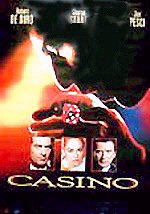 Study
Questions: Week Thirteen
Study
Questions: Week Thirteen Study
Questions: Week Thirteen
Study
Questions: Week Thirteen
"I Always Wanted to Be a Gangster": The Hero as Goodfella
Goodfellas (1990) and Casino (1995)
Scorsese draws both on his intimate knowledge of Italian life and of American film genres (here the gangster film) to transform the fates of his characters into parables of the American Dream. Following in the footsteps of Francis Ford Coppola, whose Godfather, Part I and Part II redefined the genre, Scorsese identifies his mid-century ethnics with the spirit of America itself, and their experiences become metaphors for post-WWII America. Goodfellas recounts the personal rise and fall of a central character who achieves success and loses it through excess. Casino uses the transformation of Las Vegas as a comment on the transformations taking place in the country at large.
Goodfellas: As Far Back As I Can Remember, I Always Wanted to Be a Gangster.
1. Why does Henry Hill want to be a gangster? How is being a gangster a way of living more fully (when compared to the life of his parents)?
2. The film's opening sequence is followed by a flashback beginning with Henry Hill saying longingly "I always wanted to be a gangster." How does what is going on in the car comment ironically on this boyhood yearning?
3. How does his father's failure to achieve the American Dream destroy his relationship with his son?
4. What is it that makes Jimmy Conway (Di Niro) so glamorous role model? How do his clothes stand as a metaphor for his way of life?
5. Why does Scorsese choose to show the airport robbery and to focus on the planning and the aftermath instead? How does the choice set the film apart from Hollywood action films such as The Rock, etc.
6. What attracts Karen to Henry? Is her attraction plausible? Why is she so willing to defy her parents?
7. How does Scorsese use freeze frames to divide the film into episodes? Does the film have a conventional plot? Is Scorsese's aim to tell a story or to reveal a way of life?
8. How does Karen's thoughts on the wives of Henry's associates serve to draw some important class distinctions?
9. If you were Tommy's (Pesci) mother, would you have believed the dead deer story?
10. How does Tommy embody the dark side of the gangster life? Why is he killed instead of "made"?
11. How does becoming a government witness make Henry betray himself as well as Pauli and the others?
12. What old movies and songs are used to comment on the action taking place on the screen?
Casino: I Was Given a Paradise on Earth. Today It's All Gone.
1. Religious imagery pervades the credit sequence and the film's opening scenes. Ace Rothstein Robert Di Niro)is given a paradise; the explosion expells him and he falls toward flames; the money room is "sacred," "The holy of holies." What is the thematic significance of this equation of gambling and religion?
2. What is the significance of the film using multiple narrators. Do they see things differently? Is one voice more reliable than the other?
3. How is the scene of Ginger (Sharon Stone) tossing the chips (and patrons' response) a reflection of the film's central theme? What is the film's attitude toward the ordinary patrons?
4. How does Ace's desire for perfection precipitate his downfall? Consider both his business and home life. How are the failures of his career and his marriage interrelated?
5. Nicky says that he and Ace were lucky to be in Las Vegas during the 60s and 70s,-because it was "the last time that street guys like us ever got anything that...valuable." How might Las Vegas in the film stand for the United States as a whole?
6. Nicky, both as one of the film's narrators and as one of the central characters embodies the old gangster world that becomes increasing anachronistic as the film progresses. In what ways does the film show that, for all its violence, it was more alive than the corporate Las Vegas coming int being from the 1960s to the 1980s? How does the film also suggest that the same violence caused that older order to destroy itself?
7. How does Ace's attraction to Ginger and its influence on his work reflect ths same conflict between duty and desire seen in earlier films? How does the film's sound track help emphasize this conflict?
8. How does Scorsese's camera tracking relentlessly through the casinos make the gambling world appear both attractive and repulsive? How does he use patterns of images (Ace's homes, his clothes) to mark his rise and fall?
9. What, would you say, is the film's greatest weakness? Why?
10. The film closes with Ace remembering the good old days before Las Vegas became a "family-oriented operation. His narration is accompanied by the image of families walking into the new casinos. What is the significance of Scorsese's having borrowed that image from scenes of zombies invading suburban malls in George Romeo's Night of the Living Dead (1968) and Dawn of the Dead?